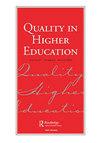准备好接受高等教育了吗?教职员工和学生对跨学科学术素养维度的看法
IF 1.5
Q3 EDUCATION & EDUCATIONAL RESEARCH
引用次数: 3
摘要
本文探讨了挪威高等教育机构和学科的初学者和工作人员的学习准备观点,重点是写作,阅读和学术工作技能。根据对学术人员和学生的焦点小组访谈,调查结果显示,初学者在一定程度上没有做好学术准备。学生们显然不习惯努力学习或独立学习,难以阅读大量文本,缺乏学术写作和阅读技能。对于努力学习的学生,研究结果显示了非选择性学习计划和选择性学习计划之间的差异。选择性课程,例如法律,似乎更有条理,更符合高中教育。参加这些课程的学生是经过积极挑选的群体,他们被期望比参加公开课程的学生准备得更好。这篇文章为学生和教职员工提供了跨学科和跨机构学习准备的综合视角,对进一步的研究和高等教育质量具有启示意义。本文章由计算机程序翻译,如有差异,请以英文原文为准。
Prepared for higher education? Staff and student perceptions of academic literacy dimensions across disciplines
ABSTRACT This article explores beginner student and staff perspectives of study preparedness across higher education institutions and disciplines in Norway, focusing on writing, reading and academic working skills. Drawing on focus group interviews among academic staff and students, findings show a certain academic unpreparedness by beginner students. Students apparently are not used to working hard or independently enough, struggling to read large text amounts, showing a lack of academic writing and reading skills. For hard-working students, findings show differences between non-selective and selective study programmes. Selective programmes, for example, law, seem to be more structured and aligned with upper-secondary school. Students in these programmes are a positively selected group, expected to be better prepared than their counterparts in open programmes. The article contributes to a combined perspective by students and staff on study preparedness across disciplines and institutions, with implications for further research and quality in higher education.
求助全文
通过发布文献求助,成功后即可免费获取论文全文。
去求助
来源期刊

Quality in Higher Education
EDUCATION & EDUCATIONAL RESEARCH-
CiteScore
3.30
自引率
14.30%
发文量
32
期刊介绍:
Quality in Higher Education is aimed at those interested in the theory, practice and policies relating to the control, management and improvement of quality in higher education. The journal is receptive to critical, phenomenological as well as positivistic studies. The journal would like to publish more studies that use hermeneutic, semiotic, ethnographic or dialectical research as well as the more traditional studies based on quantitative surveys and in-depth interviews and focus groups. Papers that have empirical research content are particularly welcome. The editor especially wishes to encourage papers on: reported research results, especially where these assess the impact of quality assurance systems, procedures and methodologies; theoretical analyses of quality and quality initiatives in higher education; comparative evaluation and international aspects of practice and policy with a view to identifying transportable methods, systems and good practice; quality assurance and standards monitoring of transnational higher education; the nature and impact and student feedback; improvements in learning and teaching that impact on quality and standards; links between quality assurance and employability; evaluations of the impact of quality procedures at national level, backed up by research evidence.
 求助内容:
求助内容: 应助结果提醒方式:
应助结果提醒方式:


